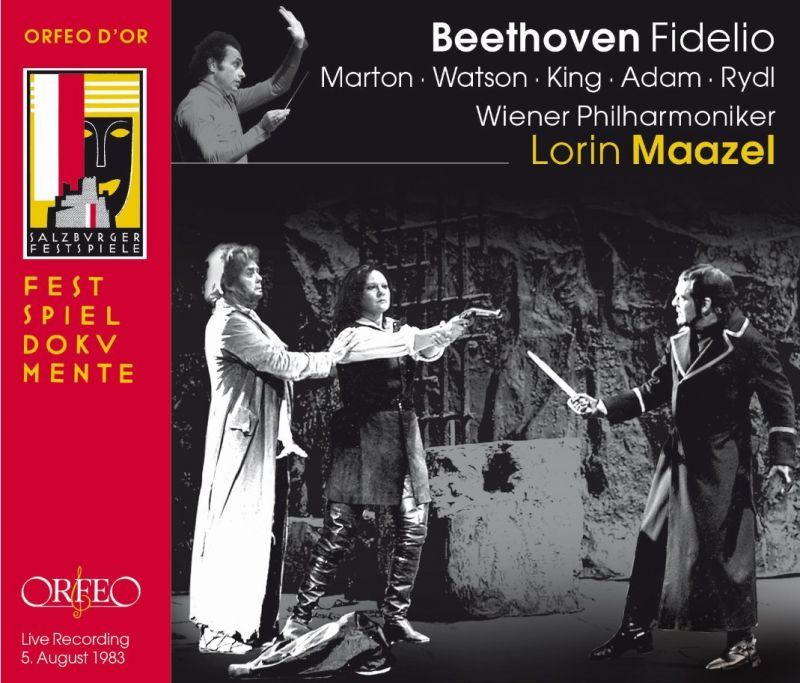BEETHOVEN Fidelio
View record and artist detailsRecord and Artist Details
Composer or Director: Lorin Maazel, Ludwig van Beethoven
Genre:
Opera
Label: Orfeo
Magazine Review Date: 04/2016
Media Format: CD or Download
Media Runtime: 138
Mastering:
AAD
Catalogue Number: C908 152I

Tracks:
| Composition | Artist Credit |
|---|---|
| Fidelio |
Ludwig van Beethoven, Composer
Aage Haugland, Rocco, Bass Eva Marton, Leonore, Soprano Horst Hiestermann, Prisoner 1, Tenor James King, Florestan, Tenor Kurt Rydl, Prisoner 2, Bass Lillian Watson, Marzelline, Soprano Lorin Maazel, Composer Ludwig van Beethoven, Composer Theo Adam, Pizarro, Bass Thomas Moser, Jaquino, Tenor Tom Krause, Don Fernando, Bass-baritone Vienna Philharmonic Orchestra Vienna State Opera Chorus |
Author: Mike Ashman
The musical performance is – of course – strictly organised, well played and unfailingly together on a nuts and bolts level. (Although I suspect it may not be exactly tight to the stage in terms of Leopold Lindtberg’s production, as ‘Maestro’ Maazel tends to begin musical cues – entries after pauses included – when he wants to.) There is, however, puzzlingly little apparent relationship between tempi and dynamics and the emotions, or tensions, one might imagine Beethoven, and the stage, were attempting to convey. Generally this is quite a ‘fast’ performance compared with various versions under Klemperer, Karajan, Colin Davis or Maazel’s own far from negligible 1963 Decca studio recording. Yet it’s unclear why it should be: as unclear in the context as the sudden slowing-up of the very end of Act 1 and of right before Florestan’s ‘Euch werde Lohn’, or the hurrying-along of Beethoven’s carefully graded dynamics of conversation with Rocco in the Act 1 finale. Yes, of course there are indications in the score of much of this but hardly with this ‘red demand’ degree of urgency. It calls attention to the podium but not to the unfolding music drama.
The cast perform strongly according to their lights, although what is left of the dialogue, despite the presence of an experienced German-speaking stage director, is no more confident than it often was from singers at this time. James King – in the seventh release of him in this role you may find from the 1970s and ’80s – is a dependably moving Florestan, more nobly broken than defiant, still able to effect the role’s tricky turns. Eva Marton can be a thrilling Leonore when she opens up, unless the unevenness of the voice moving up through the gears disturbs. Theo Adam delivers a thoroughly professional ‘bad guy’ Pizarro, Watson a superb, tinglingly fresh Marzelline and Tom Krause (Maazel’s Pizarro 20 years earlier) a forceful, definite Fernando. All that works at a high level, even if no especial sparks are struck.
Two factors hold this release back: unfathomable conducting (less clear and effective in interpretation than in 1963) and the availability of a large number of truly ‘great’ Fidelios – Bruno Walter (two), Furtwängler (three), Erich Kleiber, Klemperer (three), Böhm (at least two) and Abbado.
Discover the world's largest classical music catalogue with Presto Music.

Gramophone Digital Club
- Digital Edition
- Digital Archive
- Reviews Database
- Full website access
From £8.75 / month
Subscribe
Gramophone Full Club
- Print Edition
- Digital Edition
- Digital Archive
- Reviews Database
- Full website access
From £11.00 / month
Subscribe
If you are a library, university or other organisation that would be interested in an institutional subscription to Gramophone please click here for further information.





